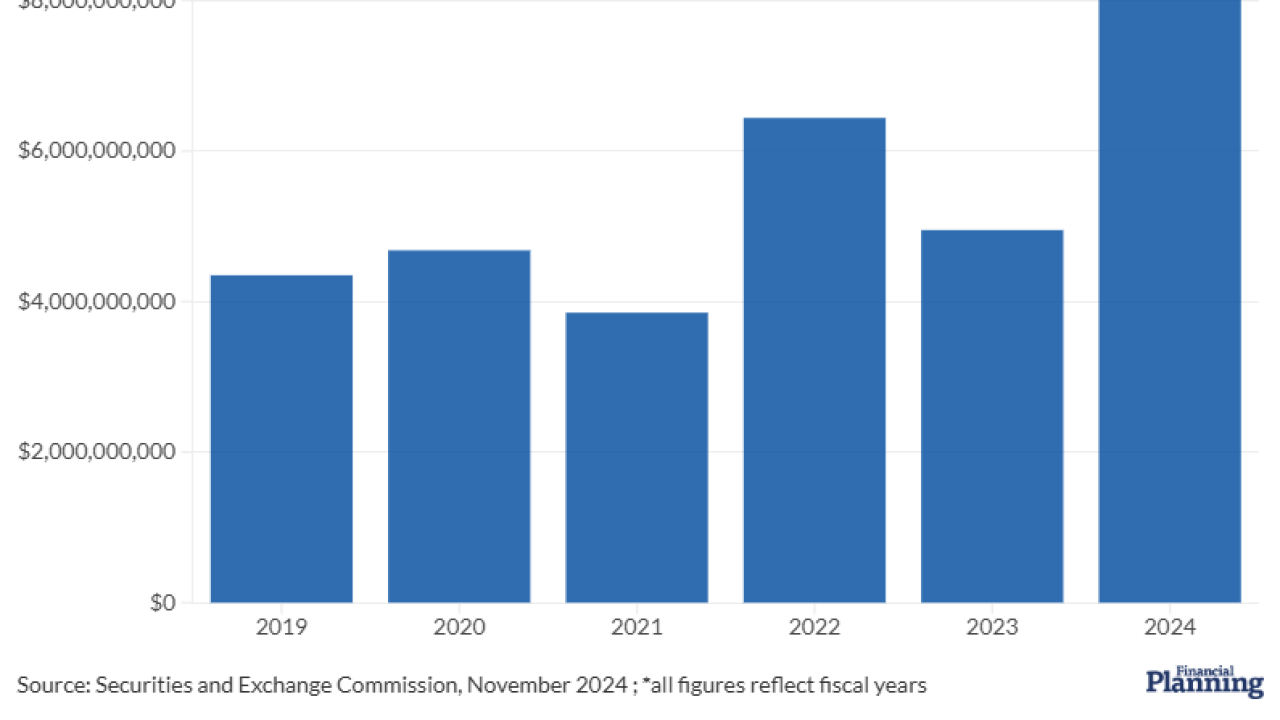Crisis Has Not Prompted Mutual Funds, Other Institutional Investors to Change Portfolios
Mutual funds and other institutional investors have remained fundamentally committed to the same investment policies they were adopting prior to the credit crisis, The Conference Board said in its annual Institutional Investment Report.
"For decades, institutional investors had been shifting their allocation preferences from fixed income securities into equity," noted Matteo Tonello, associate director of corporate governance at The Conference Board. "Then last year came, and it had a devastating effect on institutions' expanded equity portfolios."
At the end of last year, institutions had only 36.6% of their assets in equities, down from 47.2% the year before-but the change was driven by market declines rather than changes to investment policies, Tonello said.
In aggregate, institutional assets fell 21.3% in 2008 to $22.25 trillion. Mutual funds and other investment companies, which had seen the fastest growth in the last few decades, were hit the hardest by the market decline and capital withdrawals, with outflows totaling $2.5 trillion for the year, or 30.7% of their 2007 asset value. By comparison, pension funds lost 24.7% of their 2007 asset value, and insurance companies experienced a 7.8% contraction.
75% of Americans Plan on Working Well Past 65
Americans are redefining retirement, with 75% now saying they intend to work as long as they can, Bankrate found in a survey of 1,003 adults 18 or older.
Thirty-nine percent said they would continue to work because they enjoy work, but nearly one-third said they will keep their nose to the grindstone because they will need the money.
This plan may not become a reality, for only 15% of those polled who are already retired are still working. In addition, 55% of retirees worry about money and wish they had saved more, compared to only 38% who think they have enough money.
Clearly, there is an opportunity for fund companies and their sales intermediaries to help Americans save for retirement, for only 27% are working with a financial adviser, 40% are self-directed, 18% don't invest in a retirement plan, and 9% don't utilize any strategies.
Blackrock, Wellington, AllianceBernstein Raise Another $1.94B for PPIP
Three other fund companies have raised an additional $1.94 billion for the Public Private Investment Program: Blackrock, Wellington and AllianceBernstein.
With the government's debt financing and matches, they have $7.74 billion available to invest in the program.
The Department of the Treasury indicated earlier this month that Invesco and TCW Group raised $1.13 billion for the program; with the government's aid, their pool totals $4.52 billion.
U.S. Stock Funds Rose 16.6% in Third Quarter
While the average U.S. stock fund rose 16.6% in the third quarter, the average international stock fund rose 17.4%. The two best-performing categories were Latin American funds (up 26%) and global real estate funds (up 23.2%), according to data from Morningstar.
Other strong performers were European stock funds (up 21.7%), diversified emerging markets funds (up 19.8%) and foreign small-cap and midcap funds (both up 19.6%). Since the bottom of the market on March 9, Latin American funds have soared 115%, emerging market funds have delivered 90.9%, U.S. stock funds are up 63.2% and international stock funds have risen 74.6%.
Investors Ignore Fund Fees But not Performance in Ads
The mutual fund advertising rule that the Financial Industry Regulatory Authority imposed in April 2007 that requires ads to contain fee information if they are also going to tout performance appears to be for naught. Even investors aware of the importance of fees concentrate more on performance, university researchers found in a study that will appear in the December issue of the Journal of Consumer Policy. The researchers suggest that rather than present fees in isolation, the average fee in a fund's style or sector should also be presented.
Fidelity Seeks Extension For Ohio Job Creation
Fidelity has asked local, county and state governments in Covington, Ohio for more time to create an additional 350 jobs at its campus there. Fidelity moved to the location in 2005 and agreed to create an additional 1,500 jobs in exchange for a number of incentives, including a $17.5 million, 1.7-mile road leading to its complex. Fidelity moved 2,750 employees to the new site and has created an additional 1,150 jobs. The grand total of employees that Fidelity agreed to employ by Dec. 31, 2010 is 4,250. The governments granted Fidelity's request. However, if the company doesn't meet the new deadline, it will have to pay the state and local governments $5,000 for each employee below the 4,250 target.
Actively Managed Funds Fail on Performance, Risk
A Morningstar report slams actively managed funds on performance, risk and style. Only about 50% of funds have outperformed their benchmark indexes over the past three, five and 10 years and only 37% on a risk-, size- and style-adjusted basis.
Pozen: Don't Reinstate Glass-Steagall Divisions
Some politicians and commentators are calling for the resurrection of the Glass-Steagall Act, saying it was partially responsible for the 2008 financial crisis.
Robert Pozen, chairman of MFS Investment Management, writes in an editorial in the current issue of Forbes that would be a bad idea, saying that its 1999 repeal "was instrumental in resolving the liquidity squeeze on Wall Street."
The 1933 law was only loosely enforced in the first place, Pozen said, noting that banks were still investing in bonds, offering mutual funds, underwriting government securities and executing securities trades. The only thing the law effectively prevented them from doing was underwriting corporate stocks and bonds.
What actually triggered the crisis was insolvent traditional loans, rather than mortgage-backed securities, Pozen said. Further, "the repeal of Glass-Steagall facilitated the rescue of four large investment banks and thereby helped reduce the severity of the financial crisis," most notably by buoying Bear Stearns, Merrill Lynch, Goldman Sachs and Morgan Stanley.
Lastly, Pozen said, "Given the globalization of the financial markets, it would be foolhardy to prohibit U.S. banks from engaging in securities activities that are performed by their global competitors."
Financial Advisers Seek Better Income-Generating Tools
Advisers are seeking new tools and products that will complement the strategies they now have in place for retirement income planning, instead of replacing them, according to new research from Cerulli Associates.
What advisers need is some sort of hybrid product that successfully integrates asset management with guaranteed income, said Tom Modestino, senior analyst at Cerulli who wrote the report: "State of Retirement Income: Addressable Opportunity, Strategies and Future Outlook."
The problem? Nobody really has this ideal solution yet on offer, Modestino said. One of the biggest difficulties stems from the fact that this would combine competing philosophies around risk, he said. Part of a client's portfolio "needs to be slated for growth, and part needs to be taken off the table and [put into safer investments]," he said.
To be sure, Modestino said, there are a lot of individual products that can accomplish the various goals. But, there isn't a good platform that brings them together in the most beneficial way for the investor, he said.
Another major obstacle in retirement income planning cited by advisers is the complexity and excessive time required. The packaged products have an array of complicated features and protections that "make it hard to understand their inner workings from an adviser point of view," states the report. Even basic annuity products "have inflexible contracts and commission-based compensation that flies in the face of the growing channel of fee-based advisers," the report said.
Other costs that advisers often overlook when doing retirement planning for clients are, surprisingly, healthcare and taxes. "Those are the two largest expenses [for retirees]," Modestino said. These are areas where advisers can differentiate themselves if they are more mindful of clients' needs, he said.
The research focused on the investable assets of investors age 55 to 70, what it dubbed "addressable assets." At $9.1 trillion, this market has the most potential for advisers for offering retirement strategies, Modestino said. The under-55 crowd (with investable assets of $8 trillion) is more concerned with wealth accumulation and does not have the extra twist of needing as much income. Those over 70 have $4 trillion in investable assets and are pretty much set for their portfolio strategies, Modestino said.
'Bulldog' Goldstein Loses Free Speech Case vs. Mass.
A Massachusetts court ruled that the government did not impede the free speech rights of hedge fund Bulldog Investors owner Philip Goldstein by restricting his website only to qualified investors.
Goldstein, who is known for his tenacity, famously and successfully sued the Securities and Exchange Commission in 2006 to keep it from requiring hedge funds to register. In this case, Bulldog Investors General Partnership et al vs. William F. Galvin, Secretary of the Commonwealth of Massachusetts, Goldstein struck back at Galvin, who has repeatedly defended investors rights.
Galvin sued Goldstein two years ago and fined him $25,000 for permitting full online access to his website.
"This ruling is wrong, and we are going to appeal it," Goldstein said. "Apparently, if you live in Massachusetts you have to be rich to read truthful material on a hedge fund website. They're essentially saying that you can't get a brochure for a Rolls Royce because you can't afford the car, and that is not right. We can't put anything up there because of the threat of enforcement."
Putnam's Reynolds Calls For 'New Generation' Of 401(k) Offerings
If there is anything positive to be gleaned from the financial crisis, it is that 401(k) plan designs need to be revised so they are more resistant to extreme volatility and market downturns, Putnam Investments CEO Robert L. Reynolds told executives at the National Investment Company Service Association's East Coast Regional Meeting in Boston.
Reynolds called for a "new generation" of workplace savings plans with lower volatility and lifetime income options. "We need to do more to protect working Americans from the inflation, volatility and longevity risks that can make lifelong security in retirement so hard to reach.
"The Pension Protection Act of 2006 has gone a long way toward solving the challenge of savings accumulation. Auto-enrollment, savings escalation and asset-allocation guidance all work-but we need to finish the job. The next challenge in workplace savings plans will be to offer guidelines, even guardrails, to ensure that workers' savings are protected as they reach retirement age."
Specifically, Reynolds asks sponsors, administrators, financial advisers and investors to consider lifetime income solutions, be they in an annuity or other design, relative-return strategies or absolute-return strategies.
"Preserving wealth is an active endeavor," Reynolds said. "Index funds and other passive investments that track benchmarks are guaranteed to lose value when the markets they track sink, as we saw happen to the investments of many workers last year."
(c) 2009 Money Management Executive and SourceMedia, Inc. All Rights Reserved.
http://www.mmexecutive.com http://www.sourcemedia.com/





